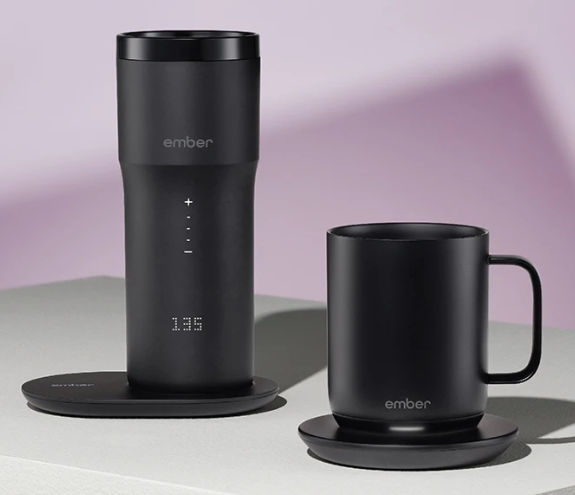
This morning when I left for work I brought, as I often do, a thermos of coffee. It was hot when I left home. But I like to sip my coffee over several hours, rather than drinking it all at once. When I took the first few sips, the coffee was the perfect temperature. But by the time I finished it about 1 o'clock, it was essentially room temperature. This happens to me every time I bring in a thermos of coffee. I can't microwave the thermos to warm the coffee back up because it's metal. I could pour the coffee into a mug and then microwave it, but that's a pain, and then I need to wash two things rather than one, so I almost never do it.
Today I was thinking about this, and it occurred to me that if the thermos had a built-in heating element, it could keep my coffee warm all day. So naturally I Googled it, and what do you know, someone has made just such a product. I had to click through a few different search results, but I quickly found this one: ember.com. Now, I had envisioned something that would plug in. But this one was battery-powered. Well, that's even better, because I frequently work in some public location, and I can't rely on there always being a power outlet where I am.
So, do you know how much time I spent reading the text on the Ember website? How much time I spent looking at their pretty pictures, or the endorsements? Almost none. I didn't care. They didn't have to communicate their value proposition to me, because I already understood it through my personal experience. Within 15 seconds I clicked on the "Shop" link to find out what it cost and how I could buy it, and I was already deep in their sales funnel.
The field of human-centered design is all about creating products of this sort - products that are perfectly aligned to some kind of real need that people have. When the process is successful, there is no need to "sell" the product in the traditional sense. Of course, that doesn't guarantee business success on its own. It may cost you more to manufacture the product than what consumers are willing to pay. You could have quality control issues. You may struggle to provide good customer service. But it shifts the equation in a really significant way.
Naturally, there are plenty of successful products that didn't emerge out of a human-centered design process. But for many businesses, perhaps most, I think that kind of process can really contribute to long-term success. Very often, you have a product, and you have reason to believe that it addresses some need for some subset of people. But you don't have a clear sense of who those people are, and what need they have that the product addresses. You know what need *you* see, but that's not the same thing as what need *consumers* feel). Until you have a crystal-clear sense of both things, it's going to be difficult to get the kind of reaction from potential customers that I had to the Ember coffee thermos.
Usually at this point, someone pulls out a pithy quote like this one from Steve Jobs:
Or this one from Henry Ford:
It might surprise you to hear that I fully agree with both quotes. You should not ask people what solutions they want, because they often don't know. But you absolutely should be gathering information from customers.
A useful analogy is the doctor-patient relationship. Imagine if you walked into a doctor's office, and they asked you, "What kind of treatment would you like today?" That sounds absurd. The point of going to a doctor is that they have had extensive training so that they can identify problems, including problems that the patient is not aware of, and recommend the best treatment for them. Why would you pay a doctor if they're just going to ask you what treatment you want? On the other hand, a doctor absolutely should gather information from you, through asking questions, doing a physical exam, running lab tests, and the like. As absurd as it would be to just ask patients what treatment they want, it would be equally absurd to recommend a treatment without gathering this information.
The same thing is true in the case of developing and selling products. You probably shouldn't be asking customers what products they want. But you definitely should be trying to identify unmet needs in their lives. And you can't do that without knowing your customers - in fact, knowing them almost better than they know themselves. Once you find one of those unmet needs, it's the job of your product team to come up with elegant solutions that meet that need. If you get this right, half of your marketing is already done.